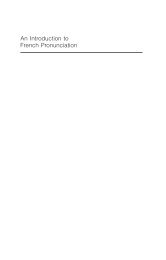English Language Teaching in its Social Context
English Language Teaching in its Social Context
English Language Teaching in its Social Context
You also want an ePaper? Increase the reach of your titles
YUMPU automatically turns print PDFs into web optimized ePapers that Google loves.
56 ROD ELLISmight profitably engage <strong>in</strong> <strong>in</strong>terpretative research themselves (ibid. : 230 onwards), the bulkof his book is written from the standpo<strong>in</strong>t of the researcher function<strong>in</strong>g as a gatherer ofknowledge and concerned with truth rather than from the standpo<strong>in</strong>t of the practitionerconcerned with action.Researchers, then, follow agendas that arc set by the requirements of the researchtraditions to which they adhere. They also have their own social agendas. As members ofuniversity departments, researchers are expected to be producers of research and arerewarded accord<strong>in</strong>g to the quantity and quality of the research they produce.To publish theymust satisfy their peers (i.e. other researchers), who function as reviewers for the journals<strong>in</strong> which they seck to be published.Their research must demonstrate that it meets establishedcriteria of reliability and validity (i.e. that it is well designed and that the results warrant theconclusions made). Researchers are not obliged to make their research accessible to teachersor to demonstrate that it is relevant to them. Still less are they required to work with teachersto f<strong>in</strong>d ways <strong>in</strong> which research can be converted <strong>in</strong>to action. Indeed, it may well be that <strong>in</strong>the departments where the researchers work practical research receives less recognitionthan pure research.As we have seen, teachers have very different agendas and operate from a differentknowledge base. Whereas researchers are concerned <strong>in</strong> establish<strong>in</strong>g the truth, teachers are<strong>in</strong>terested <strong>in</strong> f<strong>in</strong>d<strong>in</strong>g out what works.Tcachcrs select tasks that they believe will contributeto their students’ learn<strong>in</strong>g but they are rarely able to <strong>in</strong>vestigate whether their predictionsare borne out. They determ<strong>in</strong>e the succcss of the tasks <strong>in</strong> other ways (e.g. by impressionisticallyevaluat<strong>in</strong>g whether the task stimulates active participation by the learners).Teachers work from practical knowledge. They use their experience of teach<strong>in</strong>g (andof learn<strong>in</strong>g) <strong>in</strong> classrooms to develop a body of knowledge as habit and custom, as skillknowledge (c.g. how to deal with a student who dom<strong>in</strong>ates classroom discussion), ascommon-sense knowledge about practice, as contextual knowledge (i.c. regard<strong>in</strong>g theparticular class they are teach<strong>in</strong>g) and, over time, as a set of beliefs about how learners learnan L2. Polanyi (1958) refers to this k<strong>in</strong>d of knowledge as personal knowledge. As Schon(1 983) has observed, and as we noted earlier, much of this knowledge is only evident <strong>in</strong> use(i.c. it is revealed <strong>in</strong> actual teach<strong>in</strong>g but the teacher cannot articulate it) although some of itmay become espoused through reflection (i.c. the teacher can provide an explicit accountof it).Given these differences <strong>in</strong> goals and <strong>in</strong> what counts as knowledge, the gap betweenresearch and pedagogy and the gulf between researchers and teachers is not surpris<strong>in</strong>g.Zahorik (1 986), cited <strong>in</strong> Freeman and Richards (1 993), has identified a number of differentways <strong>in</strong> which teach<strong>in</strong>g can he conceptualized. Scientifically based Conceptions emphasizethe development of models of effective classroom practice based on the results of empiricalresearch. This is the k<strong>in</strong>d of conception we are likely to f<strong>in</strong>d <strong>in</strong> researchers. Alternativeconceptions are values-based (i.e. effective practice is that which takes <strong>in</strong>to account theidentity and <strong>in</strong>dividuality of learners) and art--craft (i.e. effective practice is built up graduallythrough experience and reflection). It is these conceptions that we arc more likely to f<strong>in</strong>d <strong>in</strong>teachers. As a consequence, some teachers may feel that research is of little value to them,not just because it is difficult to access (a familiar compla<strong>in</strong>t), but because it does not conformwith their own ideas of what teach<strong>in</strong>g is and, therefore, does not address their concerns.Other teachers, however, may feel that their own Conceptions of teach<strong>in</strong>g lack value andstatus <strong>in</strong> comparison to the scientifically-based Conceptions ofrcscarchcrs. As Bolitho (1 991 :25) notes, ‘teachers often take up extreme positions, often deferr<strong>in</strong>g bl<strong>in</strong>dly to theory orreject<strong>in</strong>g it out of hand as irrelevant to classroom issues’. In either case, the outcome isunsatisfactory’.












